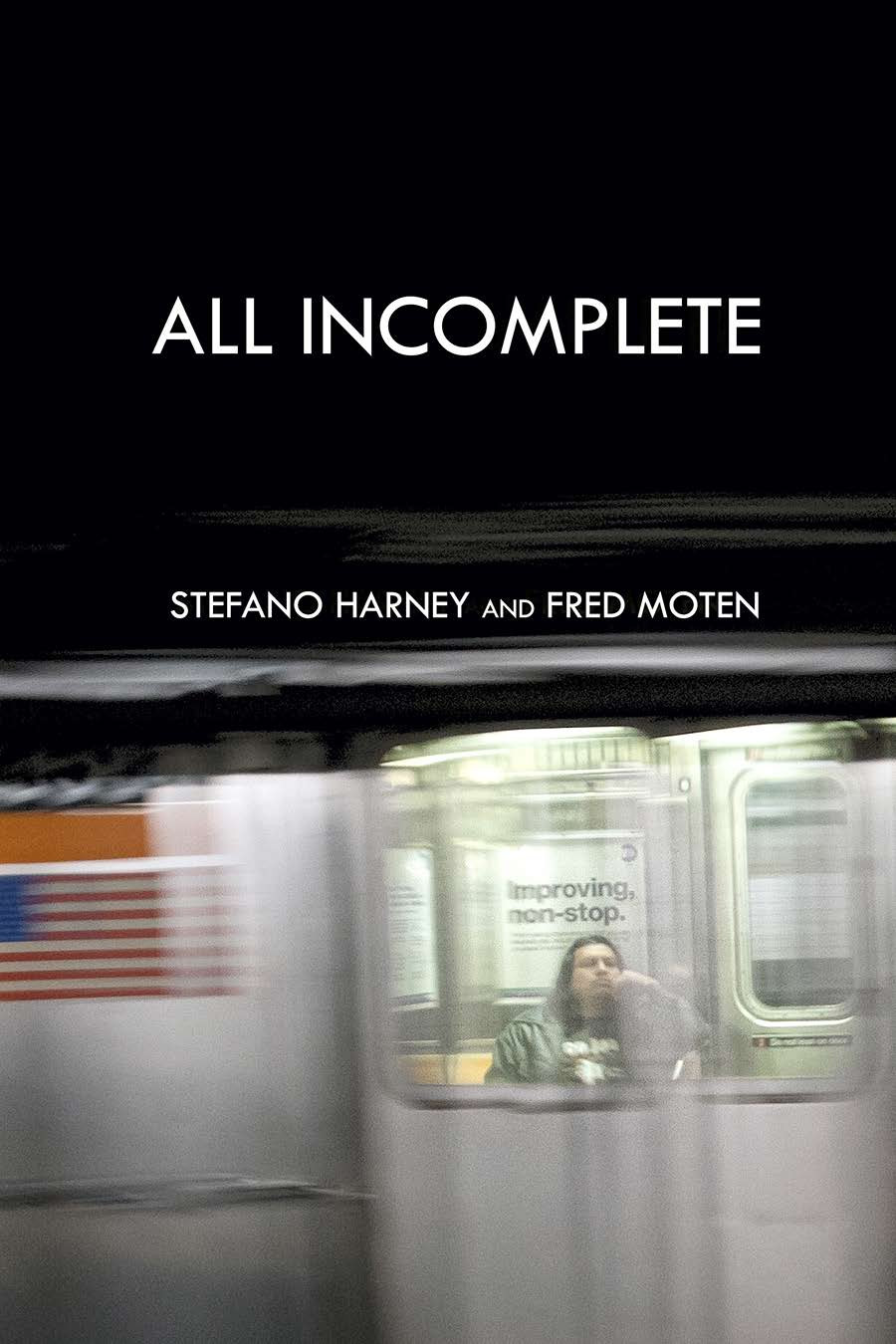Stefano Harney, Fred Moten: All Incomplete (2021)
Filed under book | Tags: · assembly, individuation, logistics, sovereignty

“Building on the ideas Harney and Moten developed in The Undercommons, All Incomplete extends the critical investigation of logistics, individuation and sovereignty. It reflects their chances to travel, listen and deepen their commitment to and claim upon partiality.
All Incomplete studies the history of a preference for the force and ground and underground of social existence. Engaging a vibrant constellation of thought that includes the work of Amilcar Cabral, Erica Edwards, Denise Ferreira da Silva, Cedric Robinson, Walter Rodney, Hortense Spillers and many others, Harney and Moten seek to share and understand that preference.
In so doing, Moten and Harney hope to have forged what Manolo Callahan, echoing Ivan lllich, calls a convivial tool that — despite the temptation to improve and demand, develop and govern, separate and grasp — helps us renew our habits of assembly.”
Foreword by Denise Ferreira da Silva
Photos and Afterword by Zun Lee
Publisher Minor Compositions, Colchester, 2021
Open access
ISBN 9781570273780, 1570273782
178 pages
Reviews: Andrew Brooks (incl. mixtape, Sydney Review of Books, 2022).
Comment (0)Matthew Fuller, Olga Goriunova: Bleak Joys: Aesthetics of Ecology and Impossibility (2019)
Filed under book | Tags: · aesthetics, animal, chance, ecology, environment, ethics, forest, individuation, nature, philosophy, plants, subject, territory, theory, virtuality

“Bleak Joys develops an understanding of complex entities and processes—from plant roots to forests to ecological damage and its calculation—as aesthetic. It is also a book about “bad” things, such as anguish and devastation, which relate to the ecological and technical but are also constitutive of politics, the ethical, and the formation of subjects.
Avidly interdisciplinary, Bleak Joys draws on scientific work in plant sciences, computing, and cybernetics, as well as mathematics, literature, and art in ways that are not merely illustrative of but foundational to our understanding of ecological aesthetics and the condition in which the posthumanities are being forged. It places the sensory world of plants next to the generalized and nonlinear infrastructure of irresolvability—the economics of indifference up against the question of how to make a home on Planet Earth in a condition of damaged ecologies. Crosscutting chapters on devastation, anguish, irresolvability, luck, plant, and home create a vivid and multifaceted approach that is as remarkable for its humor as for its scholarly complexity.
Engaging with Deleuze, Guattari, and Bakhtin, among others, Bleak Joys captures the modes of crises that constitute our present ecological and political condition, and reckons with the means by which they are not simply aesthetically known but aesthetically manifest.”
Publisher University of Minnesota Press, Minneapolis, 2019
Posthumanities series, 53
ISBN 9781517905521, 1517905524
xxviii+192 pages
PDF (6 MB)
Comment (0)Jennifer Gabrys: Program Earth: Environmental Sensing Technology and the Making of a Computational Planet (2016)
Filed under book | Tags: · citizenship, city, climate crisis, computation, data, earth, ecology, environment, experience, individuation, participation, sensors, technology, urbanism

“Sensors are everywhere. Small, flexible, economical, and computationally powerful, they operate ubiquitously in environments. They compile massive amounts of data, including information about air, water, and climate. Never before has such a volume of environmental data been so broadly collected or so widely available.
Grappling with the consequences of wiring our world, Program Earth examines how sensor technologies are programming our environments. As Jennifer Gabrys points out, sensors do not merely record information about an environment. Rather, they generate new environments and environmental relations. At the same time, they give a voice to the entities they monitor: to animals, plants, people, and inanimate objects. This book looks at the ways in which sensors converge with environments to map ecological processes, to track the migration of animals, to check pollutants, to facilitate citizen participation, and to program infrastructure. Through discussing particular instances where sensors are deployed for environmental study and citizen engagement across three areas of environmental sensing, from wild sensing to pollution sensing and urban sensing, Program Earth asks how sensor technologies specifically contribute to new environmental conditions. What are the implications for wiring up environments? How do sensor applications not only program environments, but also program the sorts of citizens and collectives we might become?
Program Earth suggests that the sensor-based monitoring of Earth offers the prospect of making new environments not simply as an extension of the human but rather as new “technogeographies” that connect technology, nature, and people.”
Publisher University of Minnesota Press, 2016
Electronic Mediations series, 49
ISBN 9780816693122, 0816693129
x+357 pages
via publisher
Reviews: Etienne S. Benson (Am J Sociology, 2017), Matthew W. Wilson (Cultural Geographies, 2017).
Interviews: Rorotoko (2016), Ulrik Ekman (Computational Culture, 2017).
Author (with links to related articles)
Publisher
WorldCat
PDF (6 MB)
Comment (0)
